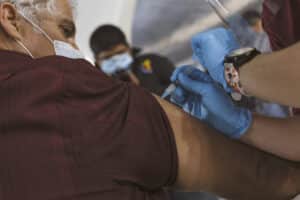Vaccine providers administering COVID-19 doses throughout Texas will be using new strategies to ensure more people who are 75 years old or older receive the vaccine.

The Texas Department of State and Health Services shared the news Thursday during their second weekly virtual news conference addressing progress of the state’s vaccine rollout.
“In line with the recommendation from our Expert Vaccine Allocation Panel, we want to put an emphasis of vaccinating people who are at least 75 years since they are at the greatest risk for severe disease and death,” Imelda Garcia, expert vaccine allocation panel chair, said.
Texas DSHS held a meeting Wednesday with hub providers to develop strategies on the best way to achieve their goal.
“Some of these might could be setting aside a specific amount of doses for our seniors, serving them during special hours, helping them move more quickly through the line with a fast-track lane, or taking vaccines directly to them through the EMS providers or Meals on Wheels like they’re doing successfully in Corpus Christi and San Antonio,” Garcia said, referring to programs reaching homebound seniors in those cities.
The next day after the meeting between the state and the hub providers, like Hidalgo County Health & Human Services, the county and the city of McAllen announced a vaccination clinic where half of the 900 doses would be reserved for individuals 65 years or older.
So far, more than 1 million doses were administered to people ages 65 and older. The number of people in that age group who were vaccinated is 913,477, or about 1 in 4 Texans in that age bracket, per the 2019 population estimate from the Texas Demographic Center.
Last week, Garcia said the state was told federal weekly allocations would be increasing but health officials said they were unsure if the allotments would stay at the increased levels.
Texas’ weekly federal allocation increased last week from 333,000 to 385,000 vaccines. Next week, Garcia said the state is expecting an allocation closer to 400,000.

The allocations do not include second doses. Those must be ordered by providers separately. At the beginning of the week, about 6,000 people, or less than 1% of vaccine recipients, were overdue for their second dose, according to Garcia.
They are encouraging people to seek out their second dose even if the designated time period between the doses lapses.
“Even if it’s seven weeks, eight weeks or longer, we still want you to get your second dose,” Garcia said.
State officials will be working with providers to ensure they are aware of the ordering process and to calculate how many doses they can pull from each vial.
Garcia said the state is encouraging providers to use all doses available within the vials. Up to 12 doses can be extracted from the Moderna vial, while six doses are available in the Pfizer vials.
“At the end of the day, we want vaccines to go into arms,” Garcia said. “We don’t want it to go in the trash. So, even if you can’t find someone that is in the 1A or 1B eligible and you might have one or two more doses left in your vial, we want you to go and find someone to use up those two other doses.”




